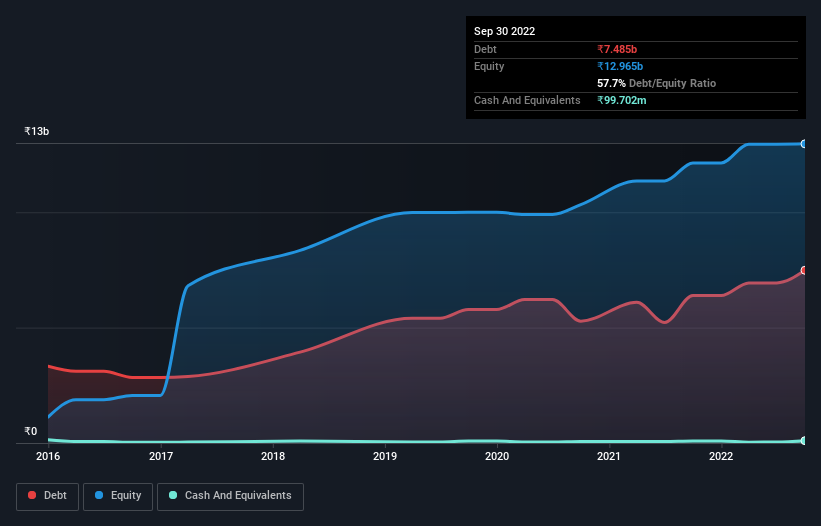- India
- /
- Electrical
- /
- NSEI:UNIVCABLES
Here's Why Universal Cables (NSE:UNIVCABLES) Has A Meaningful Debt Burden

Some say volatility, rather than debt, is the best way to think about risk as an investor, but Warren Buffett famously said that 'Volatility is far from synonymous with risk.' It's only natural to consider a company's balance sheet when you examine how risky it is, since debt is often involved when a business collapses. We note that Universal Cables Limited (NSE:UNIVCABLES) does have debt on its balance sheet. But the real question is whether this debt is making the company risky.
Why Does Debt Bring Risk?
Generally speaking, debt only becomes a real problem when a company can't easily pay it off, either by raising capital or with its own cash flow. If things get really bad, the lenders can take control of the business. However, a more usual (but still expensive) situation is where a company must dilute shareholders at a cheap share price simply to get debt under control. Of course, plenty of companies use debt to fund growth, without any negative consequences. When we examine debt levels, we first consider both cash and debt levels, together.
See our latest analysis for Universal Cables
What Is Universal Cables's Net Debt?
The image below, which you can click on for greater detail, shows that at September 2022 Universal Cables had debt of ₹7.48b, up from ₹6.39b in one year. Net debt is about the same, since the it doesn't have much cash.

A Look At Universal Cables' Liabilities
According to the last reported balance sheet, Universal Cables had liabilities of ₹10.5b due within 12 months, and liabilities of ₹4.83b due beyond 12 months. On the other hand, it had cash of ₹99.7m and ₹10.1b worth of receivables due within a year. So its liabilities total ₹5.16b more than the combination of its cash and short-term receivables.
Universal Cables has a market capitalization of ₹9.41b, so it could very likely raise cash to ameliorate its balance sheet, if the need arose. However, it is still worthwhile taking a close look at its ability to pay off debt.
We measure a company's debt load relative to its earnings power by looking at its net debt divided by its earnings before interest, tax, depreciation, and amortization (EBITDA) and by calculating how easily its earnings before interest and tax (EBIT) cover its interest expense (interest cover). Thus we consider debt relative to earnings both with and without depreciation and amortization expenses.
While Universal Cables's debt to EBITDA ratio (4.2) suggests that it uses some debt, its interest cover is very weak, at 2.1, suggesting high leverage. It seems clear that the cost of borrowing money is negatively impacting returns for shareholders, of late. The good news is that Universal Cables grew its EBIT a smooth 76% over the last twelve months. Like the milk of human kindness that sort of growth increases resilience, making the company more capable of managing debt. When analysing debt levels, the balance sheet is the obvious place to start. But it is Universal Cables's earnings that will influence how the balance sheet holds up in the future. So if you're keen to discover more about its earnings, it might be worth checking out this graph of its long term earnings trend.
Finally, a business needs free cash flow to pay off debt; accounting profits just don't cut it. So we always check how much of that EBIT is translated into free cash flow. In the last three years, Universal Cables created free cash flow amounting to 10% of its EBIT, an uninspiring performance. For us, cash conversion that low sparks a little paranoia about is ability to extinguish debt.
Our View
Universal Cables's interest cover and net debt to EBITDA definitely weigh on it, in our esteem. But its EBIT growth rate tells a very different story, and suggests some resilience. Taking the abovementioned factors together we do think Universal Cables's debt poses some risks to the business. While that debt can boost returns, we think the company has enough leverage now. There's no doubt that we learn most about debt from the balance sheet. However, not all investment risk resides within the balance sheet - far from it. For example, we've discovered 3 warning signs for Universal Cables (2 make us uncomfortable!) that you should be aware of before investing here.
If you're interested in investing in businesses that can grow profits without the burden of debt, then check out this free list of growing businesses that have net cash on the balance sheet.
New: AI Stock Screener & Alerts
Our new AI Stock Screener scans the market every day to uncover opportunities.
• Dividend Powerhouses (3%+ Yield)
• Undervalued Small Caps with Insider Buying
• High growth Tech and AI Companies
Or build your own from over 50 metrics.
Have feedback on this article? Concerned about the content? Get in touch with us directly. Alternatively, email editorial-team (at) simplywallst.com.
This article by Simply Wall St is general in nature. We provide commentary based on historical data and analyst forecasts only using an unbiased methodology and our articles are not intended to be financial advice. It does not constitute a recommendation to buy or sell any stock, and does not take account of your objectives, or your financial situation. We aim to bring you long-term focused analysis driven by fundamental data. Note that our analysis may not factor in the latest price-sensitive company announcements or qualitative material. Simply Wall St has no position in any stocks mentioned.
About NSEI:UNIVCABLES
Universal Cables
Manufactures and sells electrical and other cables, capacitors, wires and conductors, and other products under the UNISTAR brand name in India and internationally.
Mediocre balance sheet second-rate dividend payer.
Market Insights
Community Narratives



